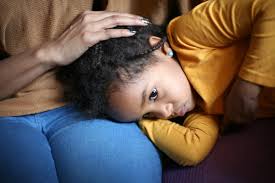As awareness increases, childhood developmental disorders are seen more in our children. I grew up not knowing I had ADHD and I was consistently punished and struggled for years with it; the impulsivity and inattentiveness it brings. Due to experiences I had growing up, I often advocate for screening children from a very early age so such conditions can be properly managed.
There are several childhood developmental disorders but we will focus on a few which include: Anxiety, Depression, Autism, Attention-Deficit /Hyperactivity Disorder, Post-Traumatic Stress Disorder, and Obsessive-Compulsive Disorder.
Anxiety Disorder
Anxiety Disorder occurs in a child when the child’s fears and worries routinely interfere with the child’s school, play, and home life. There are several types of anxiety disorders; separation anxiety, phobias, social anxiety, general anxiety, and panic disorders. Children with this disorder sometimes find sleeping difficult and may present with physical symptoms like headaches or stomach aches. Like an adult, they may get irritable, and angry and burst into tears or throw tantrums.
Depression
Depression is a sustained feeling of hopelessness or lack of interest in events and things once enjoyed. It is more frequent in older children and teenagers. Depression may present with symptoms such as prolonged sadness, a prolonged feeling of hopelessness, excessive sleep, too little sleep, reduced energy for routine activities, difficulty paying attention, and the worst of all suicidal ideas or attempts.
Autism Spectrum Disorder
Autism spectrum disorder is a developmental disorder that is caused by a slight difference in brain structures. It causes people with the disorder to act, communicate and learn in ways different from other people. Since there is a spectrum, symptoms vary in intensity from very slight differences in interactions (high functioning) to non-verbal (low functioning autism). Autism spectrum disorders hit most social interaction and communication. A lack of eye contact or failure to speak during the appropriate age range may be one of the first pointers in childhood.
Attention-Deficit /Hyperactivity Disorder
Attention-Deficit /Hyperactivity Disorder (ADHD) is associated with difficulty paying attention and controlling impulsive behavior. It can also present as hyperactivity. ADHD is ironically due to inadequate mental stimulation leading to increased activities to force such stimulation. A child with ADHD would likely daydream a lot, move or fidget too much, talk too much or take excessive risks and may find it difficult to get along with others. ADHD can be caused by genetic factors and environmental factors. It is often noticed in school but sometimes goes undetected to adulthood.
Post-Traumatic Stress Disorder
Post-Traumatic Stress Disorder (PTSD) occurs when a child develops long-term symptoms as a result of an extremely stressful event in the past. Children with PTSD may relive the stressful experience over and over. They may have nightmares, night terrors, intense fears, sudden anger outbursts, be withdrawn, irritable, or show few or no positive expressions.
Obsessive-Compulsive Disorder
Obsessive-Compulsive disorder is associated with troubling thoughts that compel specific actions. Such actions include; walking in a circle three times before bed, knocking on the table three times before calling a name three times, or excessive cleanliness. These troubling thoughts are persistent even when they are not wanted or ignored. The actions these thoughts compel often take a large chunk of the child’s day, more than one hour per day. Some symptoms include obsessions such as recurring unwanted thoughts, impulses, or images which cause distress, having to say or think about something repeatedly, and excessive hand-washing. OCD is sometimes imagined as a good thing but it is highly distressing for the child as they have to think or act repeatedly in the same patterns preventing the child from focusing on other things.
Management of Childhood Disorders
Childhood disorders are managed with medications and special techniques like cognitive behavioral therapy (CBT). CBT is very effective in the management of these childhood disorders like anxiety, depression, ADHD, and OCD. CBT targets maladaptive thoughts and aims to replace them with better adaptive thoughts which reduce symptoms. Groups which carry out programs for emotional disorders in children can also be useful in treatment.
CBT is a delicate process and should be done by trusted professionals like Eloise Collins, an inspirational Christian speaker, and a cognitive-behavioral life coach. Her experience is vast plus she has worked with several children and adults. She also has anxiety counseling services in Louisiana. If you notice any symptoms in a child, do not hesitate to visit Eloise at eloisecollins.com.







